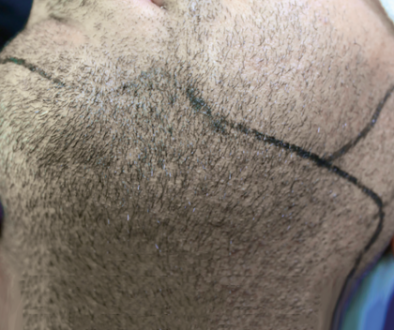Hair Transplants: Restoring a Youthful Hairline in Young Balding Men
Recently, recommended hair restoration surgeon Dr. Carlos Wesley of New York published a manuscript in the peer-reviewed journal “Cosmetic Dermatology” entitled “Illusions and Reality in Modern Hair Restoration Surgery”.
 In this manuscript, Dr. Wesley addresses the controversial trend of restoring juvenile hairlines in young men who are likely to experience further hair loss as they age. Thinning hair can be devastating for men and women of any age. However, it can be particularly difficult for those young men who see their formerly low and youthful hairlines quickly eroding to form one of the balding patterns described on the Norwood Scale. Many of these balding young men, given the opportunity, would readily choose to restore the hairline of their youth: but at what cost?
In this manuscript, Dr. Wesley addresses the controversial trend of restoring juvenile hairlines in young men who are likely to experience further hair loss as they age. Thinning hair can be devastating for men and women of any age. However, it can be particularly difficult for those young men who see their formerly low and youthful hairlines quickly eroding to form one of the balding patterns described on the Norwood Scale. Many of these balding young men, given the opportunity, would readily choose to restore the hairline of their youth: but at what cost?
Successful hair transplant surgery over the long-term is a simple matter of supply and demand. A skilled, experienced and ethical hair restoration physician will work with a prospective patient to formulate a plan that works not only today but for years to come. Doing so currently requires a fair bit of educated guessing on the part of the physician but current research aims to quantify the average number of follicular unit donor grafts available to anyone over a lifetime.
According to Dr. Wesley:
The Safe Donor Area is a well-established boundary used in hair restoration surgery (HRS) that defines the zone from which the most likely “permanent” hair follicles may be harvested for subsequent transplantation. It does not, however, provide a quantitative estimate of the yield of such follicles or follicular units (FU). One of the paper’s objectives is to help establish guidelines regarding the lifetime yield of “permanent” hair follicles when approaching patients – and especially young patients – suffering frorm male pattern baldness (MPB).
To this end, forty of some of the world’s most experienced practitioners of HRS with over 900 years of combined experience in the field were surveyed, and thirty-four (85%) responded. They were asked to estimate the number of FU containing “permanent” hair in 30-year-old male patients who were destined to develop either Type V or VI MPB and who presented with variable degrees of donor hair density.
While not intended to serve as scientific dogma, the results of this survey that is published within this more broad manuscript may provide a useful guideline that may help temper the concerning trend of overly-aggressive patterns of hair transplantation such as recreating low hairlines and re-establishing high hairline densities (>30FU/cm2) of a patient’s teenage years without regard for a cautious evaluation of the limitations of the likely long-term donor/recipient ratios.
The acceptance and subsequent publication of Dr. Wesley’s article will certainly help spark more discussion on this topic within our community of hair restoration enthusiasts.
—-
David (TakingThePlunge)
Editorial Assistant and Forum Co-Moderator for the Hair Transplant Network, the Coalition Hair Loss Learning Center, and the Hair Loss Q & A Blog.
To share ideas with other hair loss sufferers visit the hair loss forum and social community
Get Proven Treatments at the Best Prices by visiting our new online hair loss treatment shop.
Watch hair transplant videos on YouTube
Follow us on: Facebook | Twitter | YouTube
Technorati Tags: hair loss, Thinning hair, balding, Norwood Scale, hair transplant, hair restoration, follicular units, male pattern baldness, MPB, hair transplantation




May 24, 2012 @ 9:54 am
Interesting post. I have been wondering about this issue,so thanks for posting.